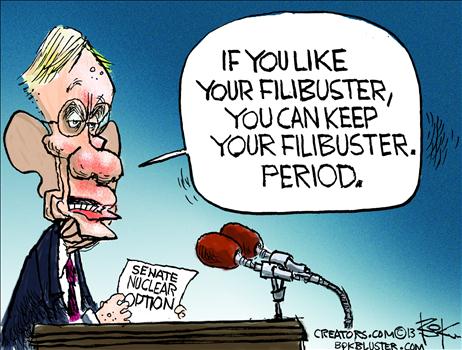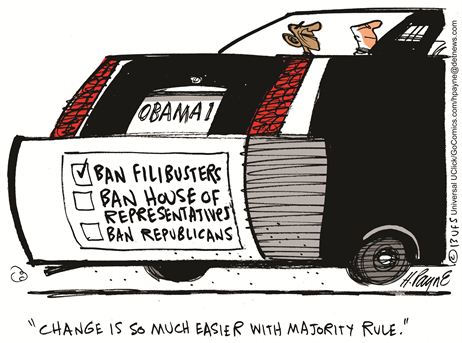Nearly everyone in America believes in majority rule, but that comes in different forms. Majority rule doesn’t always mean a simple majority—anything above 50%—but can also be set up as a type of super-majority. That’s why the Founders said that amendments to the Constitution would require 3/4 of the states voting in favor, not just one more than half. They also said that presidential vetoes could be overridden by a 2/3 vote in each chamber of Congress. Similarly, no president can be removed from office by a slight majority of senators; that action also calls for a 2/3 vote in favor of removal. Can you imagine how many presidents might have been impeached and removed if it took only 1/2 plus one to achieve the objective?
Some decisions should take longer to debate, immune from any one party that has only a simple majority running roughshod over the minority. Last week this came to a head in the Senate, and Majority Leader Harry Reid chose to push Senate rules off the cliff [pardon any mixed metaphors]. For the entire history of the Senate, debate has been protected, and minority views have always had a full hearing before a vote. With 100 senators present, it takes 60 of them to vote to close off debate and/or end a filibuster. Well, at least that was the rule until Reid’s ploy. Now, all executive and judicial appointments can be affirmed with only 51 votes. Who needs the old rule?
Reid, however, in former years when he was in the minority, complained loudly when Republicans, stymied by Democrats’ resistance to President Bush’s nominees, talked about changing the rules themselves. At the time, Reid was adamantly opposed to any change and referred to it as the “nuclear option.” At the time, he was Mr. Filibuster, championing the rights of the minority:
Just as telling, then-Senator Obama also spoke up on the floor of that body, arguing against any change because it would hamper democratic debate and just cause more division. Well, that was then. Now he applauds Reid’s action and all those Democrats who went along with it. Neither of them refer to it as the nuclear option anymore, but that doesn’t change its nature:
Don’t be so upset, we’re told. This rule change only applies to those executive and judicial nominations [Supreme Court excluded]. But anyone even half alive and paying any attention at all to how this White House and its allies in Congress operate have legitimate reasons for deep concern:
Today, executive and judicial nominations; tomorrow, all legislation. It doesn’t take a special prophetic gift to see this coming.



